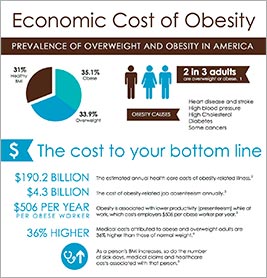Healthcare workers are at a much higher risk of obesity than the majority of occupations, according to a 2014 study by the American Journal of Medicine. In the survey, the healthcare category, overall, ranked 5th out of 20 industries with an obesity rate of 32 percent. However, analysts suggested that figure was skewed due to the inclusion of health providers, such as doctors, who have very low obesity rates. Furthermore, ‘Healthcare support’ positions, including home health aides, nursing assistants, medical transcriptionists and other non-diagnosing positions, had the third-highest obesity rate in the U.S., at 34.8 percent.
In 2014, these statistics likely alarmed leadership and HR departments of healthcare organizations. The question then becomes – are they still valid, today? The likely answer is “Yes.” In 2017, a study conducted by the University of Texas Health, found that 78 percent of Houston hospital workers, excluding physicians, were overweight or obese. The suggested cause, per researchers, was “the nurture effect.”
“People who take care of others on a regular basis are generally less likely to take care of themselves. The focus of hospitals is on patient care, so sometimes the workers’ own care can take a back seat,” said Shreela Sharma, lead author and associate professor in the Department of Epidemiology, Human Genetics and Environmental Sciences at UT Health School of Public Health.
The takeaway is that healthcare organizations need to be concerned – especially if they employ personnel, such as hospital and home healthcare workers, that perform a “nurturing” role. Yet, that doesn’t mean they have the right to take adverse action against their obese workers. In a 2018 court decision, Shell v. Burlington Northern Santa Fe Railway Company, an employer was found liable for violating Americans with Disabilities Act (ADA), even though obesity is not generally a protected status under the ADA.
How is this possible?
In this case, the prospective employer had postulated that an overweight candidate would be more likely to suffer debilitating diseases that could impact jobsite safety. When his fitness test pegged his body mass at 47.5, they withdrew the conditional offer of employment. Even though the candidate’s weight was not a disability in itself, all the potential maladies that the employer cited—sleep apnea, diabetes and heart disease—are covered under the ADA, so the company was found to have violated the act.
Companies have every right to be concerned about obese, employees and even job candidates, but they should tread carefully before taking adverse action against them. A safer approach is to cultivate a culture of fitness in the organization and provide time for everyone – whether obese or not – to exercise during the workday.
Read about the UT Health study here. Read the complete American Journal of Medicine Study, here.

